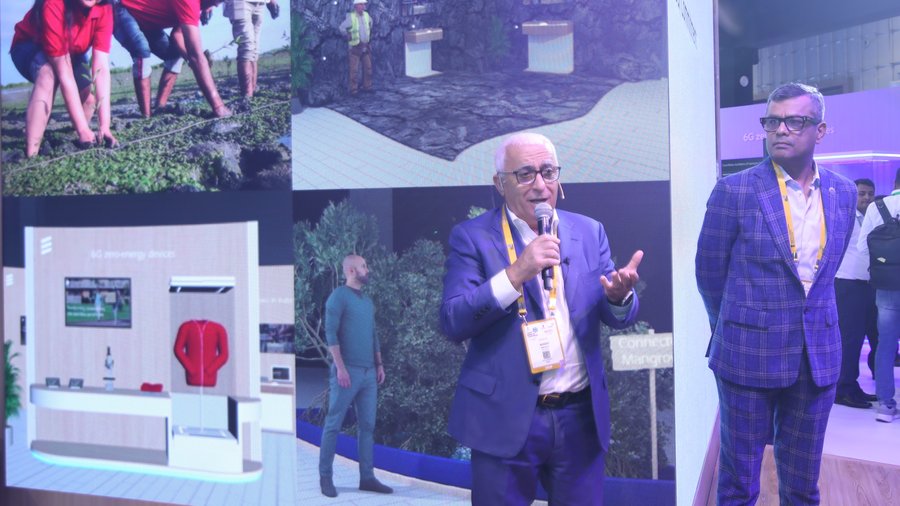Ericsson’s India 6G Research Program at its Chennai R&D Center
Today at the India Mobile Congress 2023, Ericsson announced the launch of its ‘India 6G‘ program with the establishment of an India 6G Research team at its Chennai R&D Center. Ericsson stated that the ‘India 6G’ team consists of senior research members and a team of experienced researchers in Radio, Networks, AI, and Cloud. They have been tasked with developing fundamental solutions for the future.
The India Research team, in collaboration with Ericsson research teams in Sweden and the US, will work together to develop the technology that will enable the delivery of a cyber-physical continuum. In this continuum, networks will provide critical services, immersive communications, and omnipresent IoT, all while ensuring the integrity of the delivered information.
The 6G Research team in India, in collaboration with Ericsson Global Research teams, will develop novel solutions. The teams are working on various projects, including Channel Modelling and Hybrid Beamforming, Low-energy Networks, Cloud Evolution and Sustainable Computing, Trustworthy, Explainable, and Bias-Free AI algorithms, Autonomous Agents for Intent Management Functions, Integrated Sensing and Communication Functions for the Man-Machine Continuum, and Compute Offload to Edge-Computing Cloud, among others.
“By establishing a dedicated 6G research team for in-country research, contextual to India’s need and collaborating with the world class research programs across international research labs, we look forward to incorporating the needs of India into the mainstream of telecommunication technology evolution. “stated Magnus Frodigh, Head of Research at Ericsson.
Ericsson says it is partnering with premier institutes in India for Radio, AI and Cloud Research. The company said, “AI Research is of high importance to Ericsson as the 6G networks would be autonomously driven by AI algorithms. Ericsson is also looking to partner with other premier engineering institutes in India for 6G related research.”
The Centre for Responsible AI is an interdisciplinary research centre that envisions becoming a premier research centre for both fundamental and applied research in Responsible AI with immediate impact in deploying AI systems in the Indian ecosystem. AI Research is of high importance to Ericsson as the 6G networks would be autonomously driven by AI algorithms. Ericsson is also looking to partner with other premier engineering institutes in India for 6G related research.

Ericsson in India:
Ericsson is reportedly partnering with Communication Service Providers, Bharti Airtel, and Reliance Jio to deploy 5G in the country.
According to the statement, Ericsson has been present in India since 1903, and the Ericsson Research team was established in 2010. With the establishment of 6G Research in India, Ericsson looks forward to playing a key role in advancing this technology in the country.
The company has three R&D centres in India, located in Chennai, Bengaluru, and Gurgaon.
References:
https://www.ericsson.com/en/press-releases/2/2023/10/ericsson-initiates-india-6g-program-in-india
https://telecomtalk.info/ericsson-announces-india-6g-program-at-imc2023/889172/
India unveils Bharat 6G vision document, launches 6G research and development testbed
Enable-6G: Yet another 6G R&D effort spearheaded by Telefónica de España
Nokia to open 5G and 6G research lab in Amadora, Portugal
6th Digital China Summit: China to expand its 5G network; 6G R&D via the IMT-2030 (6G) Promotion Group
China to introduce early 6G applications by 2025- way in advance of 3GPP specs & ITU-R standards
One thought on “Ericsson’s India 6G Research Program at its Chennai R&D Center”
Comments are closed.



India talks up 6G, when its own TSDSI 5Gi has been a commercial failure, despite being included in the ONLY TRUE 5G standard ITU-R M.2150. Annex 3 (page 268 of ITU-R M.2150-2) is a Specification of the 5Gi radio interface technology. It contains the detailed information developed by the ITU and “TSDSI” (the GCS Proponent and Transposing Organizations). Yet not a single Indian telco has implemented TSDI 5Gi Radio Interface Technology (RIT)!
TSDSI RIT is a versatile radio interface that fulfils all the technical performance requirements of IMT 2020 across all the different test environments. This RIT focuses on connecting the next generation of devices and providing services across various sectors. In particular, this RIT focuses on: Enhanced spectral efficiency and broadband access; Low latency communication; Support millions of IOT devices; Power efficiency; High speed connectivity; Large Coverage (in particular for Rural areas); Support multiple frequency bands including mm Wave spectrum. While, the current specifications provide a robust RIT, the specification also provides a framework for which future enhancements can be supported, providing a future-proof technology. In the following sections, we provide a basic description of the RIT. The complete details of the RIT can be found in the specification documents.
Reference: Recommendation ITU-R M.2150-2 (12/2023)